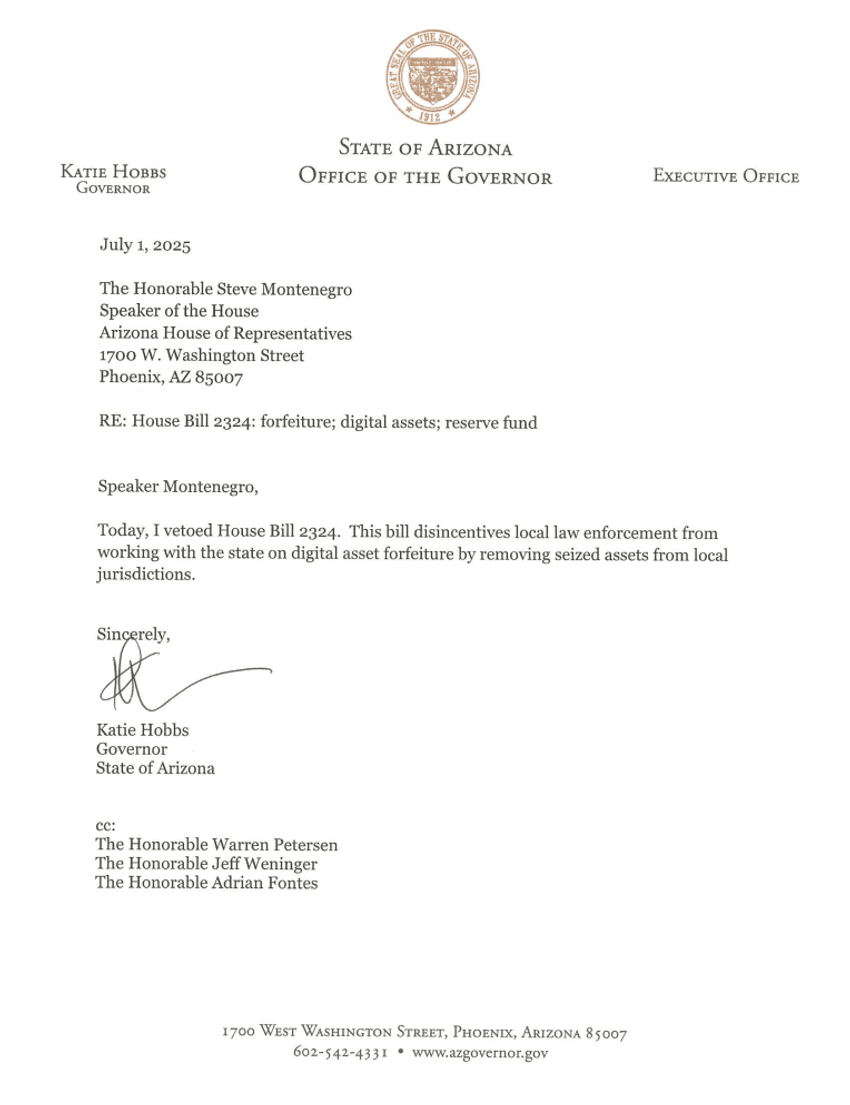Crypto Confiscation Bill Stopped at the Finish Line
Arizona Governor Katie Hobbs has once again slammed the brakes on crypto-related legislation, vetoing House Bill 2324 - a proposed law that would have created a state-run Bitcoin and Digital Assets Reserve Fund using seized cryptocurrencies. In a veto letter delivered Tuesday, Hobbs said the bill “disincentivizes local enforcement” by taking forfeited digital assets away from local jurisdictions and centralizing them at the state level.
The veto follows a rollercoaster legislative ride. Though the bill was initially rejected by the House in May, it made a comeback after a Senate reconsideration vote and was eventually passed by the House with a 34-22 margin on June 24. Despite that progress, Hobbs’ veto now places the bill in political limbo - and a two-thirds majority override looks unlikely, unless several lawmakers flip their stance.
What the Bill Would Have Done
HB 2324 aimed to formalize the seizure and storage of cryptocurrencies obtained through criminal forfeiture in Arizona. It proposed to:
- Create a digital assets reserve fund
- Allocate the first $300,000 from any seized crypto to the attorney general’s office
- Split any amounts above that: 50% to the AG, 25% to the state general fund, and 25% to the reserve

Governor Hobbs’ veto letter for HB 2324. Source: Arizona Governor’s Office
The bill was part of a broader push to integrate crypto into state-level financial infrastructure, and advocates saw it as a move to modernize digital asset handling within Arizona’s legal system.
Hobbs’ Repeated Rejections of Crypto Bills
This is not the first crypto bill vetoed by Governor Hobbs. In May 2025, she blocked Senate Bill 1025, which would have created the Arizona Strategic Bitcoin Reserve, allowing the state to invest up to 10% of its assets in Bitcoin. Hobbs cited that “cryptocurrencies are untested investments”, a claim that drew backlash from Bitcoin proponents online.
She also vetoed Senate Bill 1373, which proposed a Strategic Digital Assets Reserve that would function similarly to HB 2324 — once again, aiming to manage crypto seized by law enforcement.
The only crypto bill to make it past Hobbs’ desk this year was House Bill 2749, signed in May 2025. That measure integrated crypto assets into Arizona’s financial and unclaimed property laws, including a provision to establish a Bitcoin and Digital Assets Reserve Fund under the state treasurer’s control — a more tempered version than HB 2324’s aggressive forfeiture fund.
?? JUST IN: Arizona Governor Katie Hobbs has vetoed the state’s digital assets reserve fund bill HB2324.
— Cointelegraph (@Cointelegraph) July 2, 2025
She claimed the bill would prevent local law enforcement from cooperating with the state on digital asset forfeiture by removing seized assets from local jurisdictions. pic.twitter.com/d4LI2j8ASH
?? JUST IN: Arizona Governor Katie Hobbs has vetoed the state’s digital assets reserve fund bill HB2324.
— Cointelegraph (@Cointelegraph) July 2, 2025
She claimed the bill would prevent local law enforcement from cooperating with the state on digital asset forfeiture by removing seized assets from local jurisdictions. pic.twitter.com/d4LI2j8ASH
Arizona’s Crypto Race Trails Other States
While Arizona struggles to pass comprehensive crypto reserves laws, other states are pushing forward. Texas Governor Greg Abbott recently signed legislation creating the Texas Strategic Bitcoin Reserve, designed to hold Bitcoin as part of the state’s official asset portfolio.
Likewise, New Hampshire approved a bill in May that allows investment in both cryptocurrencies and precious metals, part of a growing trend among states to explore alternative reserve strategies. At least six other US state legislatures currently have bills under review aiming to create similar crypto reserves, according to Bitcoin Laws data.
What’s Next for Arizona?
Governor Hobbs’ latest veto may cool momentum for crypto initiatives in Arizona — at least for now. The state’s crypto community and legislators are facing a repeated reality: governor-level skepticism toward treating digital assets as reliable long-term stores of value or legitimate instruments for law enforcement and treasury use.
Unless lawmakers regroup with a less centralized version of the proposal or succeed in persuading Hobbs of crypto’s potential benefits, the Bitcoin reserve dream in Arizona may remain on hold.



